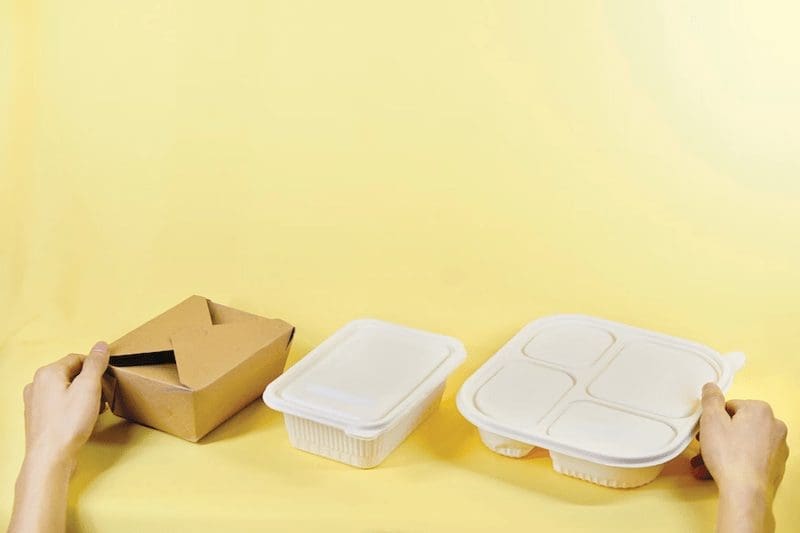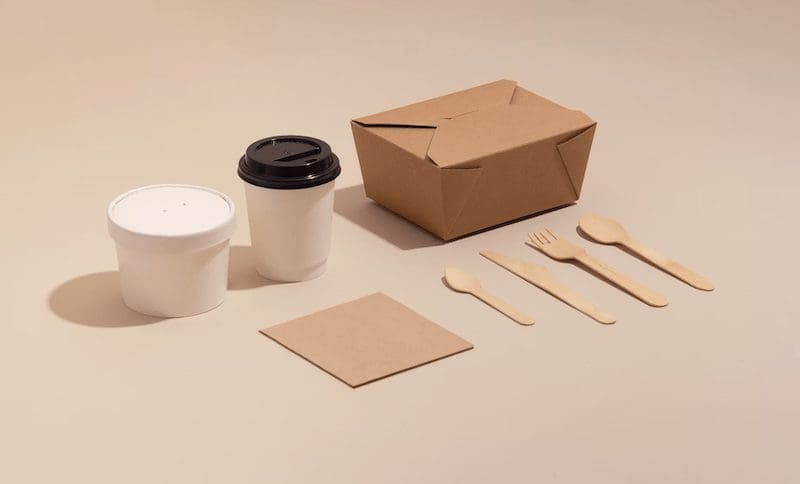The restaurant industry is increasingly focusing on environmental sustainability. Customer demand for eco-friendly business practices continues to rise as more people become conscious of their carbon footprint.
Research shows that all else being equal, over 70% of diners would choose an establishment that prioritizes sustainability over one that does not. For restaurant owners, incorporating sustainability into operations makes good business sense.
One effective way restaurants can reduce their environmental impact is by switching to compostable service. Compostable plates, cups, and cutlery are designed to fully decompose in commercial composting facilities, keeping waste out of landfills.
Unlike plastic or paper products that persist in landfills for decades, compostable items break into organic matter within a few months. By making the switch, restaurants can transform how they sustainably serve customers daily.
The Impact of Going Green
Recent research from leading chemists found that transitioning from plastic to compostable materials can significantly reduce your environmental impact. According to their life cycle assessments published in Environmental Science & Technology, compostable food service ware emits 43% less carbon emissions. It uses 28% less non-renewable energy during processing than conventional plastic alternatives.
By choosing compostable ware, restaurants also send far less to landfills. In the US alone, over 7 million tons of plastic packaging becomes waste annually. But when composted properly, plates and utensils made from renewable plant fibers fully biodegrade within months, returning nutrients to the soil. The study concludes compostable options offer compelling sustainability benefits that businesses should embrace. Not only will you delight the 57% of patrons who prioritize eco-friendly options, but you’ll also cut costs by avoiding pricey plastic trash disposal fees.
Why Choose Compostable Products?
There are compelling reasons for restaurants to use compostable products. Firstly, they are better for the environment since they do not pollute lands or waterways like plastics. Traditional plastic cutlery, for instance, takes hundreds of years to decompose.
This eliminates the need to landfill or incinerate discarded food service ware, keeping millions of pounds of waste out of landfills annually. Switching to compostable dinnerware significantly reduces a restaurant’s carbon footprint and waste management costs. It is also a smart marketing move.
An increasing number of customers seek out sustainably-operated businesses and are willing to pay more for eco-friendly options. Offering compostable products demonstrates that a company cares about environmental protection and values its clientele’s views on such issues.
Comprehensive Guide to Compostable Products
Plates / Portion Cups

There are various compostable and biodegradable plate options for any cuisine or budget. Plain plates made from plant-based materials like bamboo or bagasse (sugar cane fibers) offer an affordable basic solution. For a touch of luxury, decorative compostable plates made with corn or palm leaf fibers come in different shapes, textures, and designs.
Cups

Whether for hot or cold beverages, compostable cups in various styles are widely available. For hot drinks, sugarcane fiber or poly-lactic acid (PLA) plastic cups mimic disposable paper ones in look and feel. Plant-based cold cups, including thick insulated versions with wax or resin coating inside, are also common.
Cutlery

Compostable forks, knives, and spoons give diners an eco-friendly way to eat with convenience-matched plastic versions. Cutlery is made from corn starch or PLA, retaining flexibility and strength during use before fully degrading. Some innovative restaurants even offer decorative compostable bamboo or wooden chopsticks.
Depending on operations, restaurants can stock any combination of the above products and slowly phase in compostable alternatives as existing supplies run out. Compostable serviceware requires no change in day-to-day usage—it looks and performs just as well as traditional disposables. Most importantly, it fully biodegrades within a commercial composting facility’s set conditions.
Read More: Maximizing Your Culinary Adventures: A Guide to Sustainable Eating While Traveling
Green Paper Products’ Compostable for Eco-Friendly Restaurants
Green Paper Products offers a variety of certified compostable products that are perfect for any eco-friendly restaurant. Their plant-based EverGreen food containers are great for takeout, providing leak-resistant performance comparable to plastic clamshells. Made from sugarcane fiber, Green Scene packaging is an excellent sustainable alternative for pizza delivery.
Green Paper’s corn-based Green Works cutlery glides smoothly, and its fiber-coated Green Leaf plates are durable, affordable, and can withstand wet/greasy foods. Combined, these products make catering to a sustainable-minded clientele easy and affordable.
The most common options include bagasse plates made from sugarcane fiber byproducts, corn-based plastic, and wood-pulp-based containers and utensils. All meet international standards for compostability in professional facilities.
Various product form factors let restaurateurs make the switch seamlessly. Divided containers sustainably package multi-item meals, while flatware comes in various color options to match any brand image.
Even takeout bags and pizza boxes are now compostable. With many varieties tailored for different menus, any operation can easily integrate products into their existing workflows and cater to customers seeking more eco-friendly choices.
Read More: How Students Can Incorporate Sustainable Practices into Culinary Travel Experiences
Implementing Compostable Solutions in Your Restaurant

Transitioning fully to compostable items involves some initial planning. The first step is choosing a reputable supplier with a wide selection, competitive pricing, and reliable delivery. Stock up on the necessary quantities before making the switch to avoid stock-outs.
Familiarize staff with the new products’ appearance and proper disposal in commercial composting bins instead of trash cans or recycling.
Communicate the change to customers using on-premise signage, highlighting the sustainability initiative. Consider promotions like discounts for diners bringing their reusable containers to go. Over time, existing plastic and paper inventories will be phased out to commit fully to the new system.
With the right provider, restaurant managers receive ongoing support, which answers any implementation questions and helps publicize these green efforts.
Challenges in Transitioning to Compostables
Here are a few possible challenges restaurants may meet when transitioning to compostable products:
Cost: While compostable items are becoming more affordable, the initial costs of switching over full procurement to these products and servicing compost collection can be higher than those of conventional plastics.
Awareness: Restaurants must inform staff and customers about the transition. Signage is required to show which bins are for compost and which remain trash. Education may be needed to build comfort with these new sustainable options.
Supply chain: Research is required to find distributors who reliably supply compostable options in all necessary forms and volumes. Inventory management must adapt to any new product handling needs.
Workflow adjustments: Front-of-house and back-of-house workflows may need revisions to accommodate compost collection logistics. New procedures are also required for cleaning/drying compostable items.
Improper disposal: There is a learning curve as customers adapt to no longer trashing compostable serviceware. Signs help, but occasional mistakes may still result in compost-worthy items contaminating landfill bins initially.
Policy gaps: Local waste management infrastructure for commercial composting may still be developing in some jurisdictions, with limitations around the types/volumes accepted or other mandatory pre-processing.
Certification confusion: With various global compostability certifications, restaurants need guidance distinguishing truly organic options from greenwashing claims.
Consistency concerns: Compostable plastics are sensitive to temperature conditions during commercial composting. Restaurants rely on partners to maintain suitable processes.
Beyond the Basics: Expanding Your Restaurant’s Sustainability Efforts

While adopting compostable serviceware takes restaurant sustainability to the next level, additional high-impact programs can further strengthen a brand’s eco-credentials. For instance, back-of-house practices like bulk ingredient purchasing and portion control training cut food waste.
Energy savings come from switching to LED lighting and efficient kitchen equipment. Carefully managing waste pickup frequencies or installing portable solar panels also saves on utility bills.
Tell the sustainability story prominently on your website and share updates via social media. Customers want to support businesses demonstrating genuine corporate responsibility through meaningful green initiatives.
Consider applying for prestigious certifications from organizations like the Sustainable Restaurant Association to showcase environmental leadership publicly. Ongoing improvement depends on benchmarking performance annually and researching emerging eco-products.
Final Thoughts
Given the current consumer condition, sustainability is not an option but a necessity for restaurants striving to stay relevant and competitive. Compostable food service items are a foundational building block of any successful environmentally-minded operation, as they directly reduce carbon footprints and landfill waste.
With the entire supply chain transitioning to eco-friendly solutions, now is the ideal time for operators to commit to their sustainability journeys.
By adopting compostable products and implementing further initiatives highlighted, restaurants of all sizes can build rapport with their clientele while paving the path towards a greener future.


